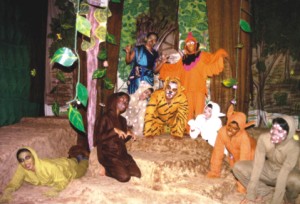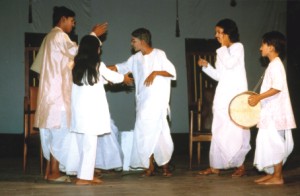Theatre
Children's
Theatre Movement
marching forward
Sabira
Manir
 Theatre
for children, although has not been popularised as in the
West, its importance is certainly growing. Last month's National
Children's Theatre organised by the People's Theatre Association
(PTA) at the Public Library auditorium had 65 children theatre
groups from all over Bangladesh. About 10,000 children came
to see the plays. Theatre
for children, although has not been popularised as in the
West, its importance is certainly growing. Last month's National
Children's Theatre organised by the People's Theatre Association
(PTA) at the Public Library auditorium had 65 children theatre
groups from all over Bangladesh. About 10,000 children came
to see the plays.
Apart
from the activities of Bangladesh Group Theatres, the children's
theatre movement is making good progress. About 110 children's
theatre groups that are concerns of the PTA hold performances
across the country. Led by PTA, children's theatre has been
gathering momentum for the last 15 years.
Drama
is no longer a mere entertaining medium but a leading tool
of learning for kids. The "Drama Therapy" or the
"Creative Therapy" has become a popular way to help
children to develop creativity.
Director
of PTA Liyaqat Ali Lucky says, "The first and foremost
thing that is required to develop a child is to understand
him. No child can develop himself if we fail to identify his
needs."
The
children's theatre activities started in Bangladesh way back
in 1970 and was an endeavour of "Kochikachar Mela".
The activities started to spread over since 1973. In 1976,
"Shishu Natyam" was active in child theatre.
After that, "Dhaka Little Theatre" was formed in
1978. This group staged plenty of plays in the stages of Dhaka.
Right after the forming of "Dhaka Little Theatre",
"Obhijatrik Kishore Natyagoshthi" started
rolling with a lot of promises. Through "Obhijatrik"
Nazma Jasmine Chowdhury came forward to stage children's plays
in 1980. Even a theatre magazine was published by the group.
After seven long years, the "Shishu Kishor Sanskritik
Federation" was formed in 1987. This federation
brought "Dhaka Little Theatre" under the same umbrella.
But the federation was extinct due to several reasons.
 Bangladesh
Shishu Academy organised a few theatre festivals to take the
children's theatre a step ahead. But it did not go as far
as expected. Such activities were flagged in the mid eighties.
In 1990, the secretary general of PTA and the director of
"Loko Natyadal" Lucky took the initiative
and came up with some plans. PTA was able to speed up the
children's theatre practices within a very short span of time. Bangladesh
Shishu Academy organised a few theatre festivals to take the
children's theatre a step ahead. But it did not go as far
as expected. Such activities were flagged in the mid eighties.
In 1990, the secretary general of PTA and the director of
"Loko Natyadal" Lucky took the initiative
and came up with some plans. PTA was able to speed up the
children's theatre practices within a very short span of time.
PTA has
already completed six children's theatre festivals. "We
believe that these festivals will spread theatre practices
in each school of the country," says Lucky -- and this
will subsequently help bring a large number of kids to take
up in performing arts.
PTA's
efforts were not limited merely to the festival. "The
children's theatre workshop" has made a positive mark
in the theatrical arena of the country. The children's theatre
movement is no longer revolving around Dhaka but is spreading
all over the country. "Theatre for children" activities
are being carried out among school-level children. Even the
workshops for children's theatre directors are giving a guideline
to the children's theatre movement. The audience is showing
increasing inclination towards watching children's theatre
as well. Theatre critics have also projected a new focus on
children's theatre.
 The
most inspiring and noteworthy thing about Bangladesh's childrens
theatre is that it has established a unique place of its own
even in the international field of theatre. The International
Children's Theatre Festival started in the city of Lingen,
Germany in 1990. Bangladesh first participated in the festival
in 1994 along with 22 other countries. The play "Sanghar"
directed by Lucky which was adopted from "Fandibaj Bagh"
by Hashi Siddiqui was adjudged as one of the three best plays
by the critics. The two other plays were by children from
Russia and Denmark. The play "Bobby" directed by
Lucky and written by Bijoy Tendulkar was highly praised in
the fifth festival in 1998 at the same venue. In the year
2000 People's Little Theatre's musical drama "Bajao
Bishaw Bina" and Tagore's "Tasher Desh"
stirred up the Hanover festival. Another People's Little Theatre
production "Rup Bodoler Rupkatha" directed
by Lucky was the talk of the festival that took place in the
city of Tyoama, Japan in the sixth festival in August, 2000.
The play "Laloo" directed by Lucky, written
by Abdul Matin -- yet another People's Little Theatre's production
was staged in the seventh festival in the city of Lingen,
Germany in 2002. People's Little Theatre attended the eighth
festival with their Fusion Production in the 2004 Cuba festival. The
most inspiring and noteworthy thing about Bangladesh's childrens
theatre is that it has established a unique place of its own
even in the international field of theatre. The International
Children's Theatre Festival started in the city of Lingen,
Germany in 1990. Bangladesh first participated in the festival
in 1994 along with 22 other countries. The play "Sanghar"
directed by Lucky which was adopted from "Fandibaj Bagh"
by Hashi Siddiqui was adjudged as one of the three best plays
by the critics. The two other plays were by children from
Russia and Denmark. The play "Bobby" directed by
Lucky and written by Bijoy Tendulkar was highly praised in
the fifth festival in 1998 at the same venue. In the year
2000 People's Little Theatre's musical drama "Bajao
Bishaw Bina" and Tagore's "Tasher Desh"
stirred up the Hanover festival. Another People's Little Theatre
production "Rup Bodoler Rupkatha" directed
by Lucky was the talk of the festival that took place in the
city of Tyoama, Japan in the sixth festival in August, 2000.
The play "Laloo" directed by Lucky, written
by Abdul Matin -- yet another People's Little Theatre's production
was staged in the seventh festival in the city of Lingen,
Germany in 2002. People's Little Theatre attended the eighth
festival with their Fusion Production in the 2004 Cuba festival.
For the
last 10 years or so, International Children's Theatre Festival
has been held annually in the Indian cities like Delhi, Mumbai,
Orissa. PTA concerns regularly participate in these festivals.
"Almost all the productions have been admired. The little
performers were inspired and Bangladesh's image has been upheld
in all the festivals," says Lucky.
 One
of the biggest tasks is to convince the child actor's family
that theatre will ultimately benefit the child. There have
also been some obstacles in children's theatre practice aside
from the success stories. The biggest predicament comes from
the individual performer's family. Every family thinks that
the theatre practices cause trouble to a child's academic
education. But Lucky believes that children's theatre can
be a good foundation for a kid's education. "The parents
have to be made aware of the positive outcome of children's
theatre." One
of the biggest tasks is to convince the child actor's family
that theatre will ultimately benefit the child. There have
also been some obstacles in children's theatre practice aside
from the success stories. The biggest predicament comes from
the individual performer's family. Every family thinks that
the theatre practices cause trouble to a child's academic
education. But Lucky believes that children's theatre can
be a good foundation for a kid's education. "The parents
have to be made aware of the positive outcome of children's
theatre."
With the
sponsorship of ITI and CIDA, the People's Theatre Association
plans to take more steps to promote children theatre: This
includes forming school theatre, activities for children between
two and six years, workshops for children, directive and teachers.
Hopefully, these efforts will encourage more children to express
themselves through drama.
Copyright
(R) thedailystar.net 2005
| 